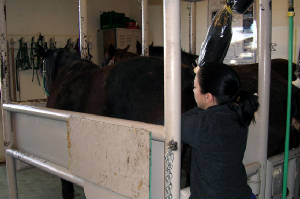|
What is theriogenology? The Dorland's Medical Dictionary
(25th Edition) defines theriogenology as "that branch of veterinary medicine which deals with reproduction, including the
physiology and pathology of male and female reproductive systens and the clinical practive of veterinary obstetrics, gynecology,
and semenology."
How do you become a theriogenologist? A theriogenologist
is a veterinarian specializing in reproduction; the first major step is attending veterinary school. This requires at least
three years of pre-veterinary study, although the most competitive of students have finished undergraduate school or
more. After four years of veterinary school, most graduates complete a one-year internship. Then, they enter a residency program
[in theriogenology]. This residency can last from two years for clinical study alone to five years for additional studies for
a Ph.D.
How do I know if theriogenology is for me? No one can
predict if you will enjoy a career as a theriogenologist, but it is highly recommended that you get first-hand experience
in the field. Attending a short course or seminar is a great way to get your feet wet. Although I have been around horses
since I was eight years old, I had limited experience in veterinary medicine. So, in January 2004, I was fortunate to attend
Colorado State University's Equine Reproductive Management and Artificial Insemination short course. I had a wonderful time
during my four days of intensive lecture and laboratory sessions. Below is a picture of me artificially inseminating a mare.

For additional information, please visit the following websites:
American College of Theriogenologists
Society for Theriogenology
Equine Sciences at Colorado State University
|

